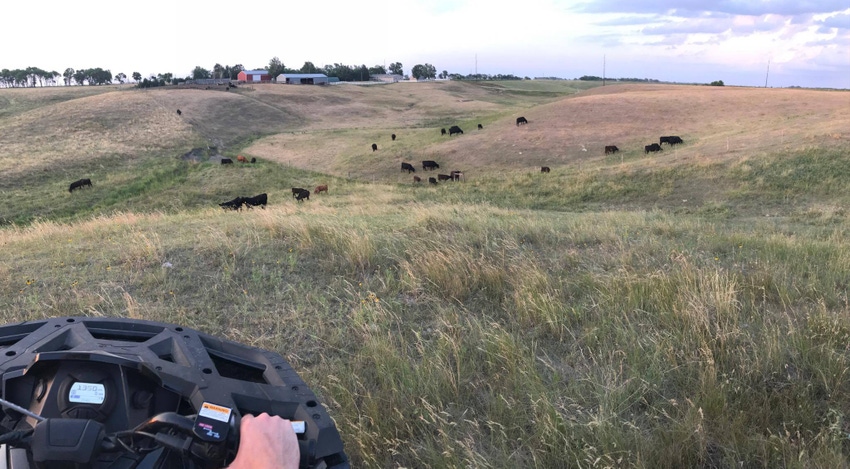What Bill Gates gets right & wrong about beef production
Bill Gates talks wrangling cattle, artificial insemination and feeding impoverished communities in Africa.
July 26, 2017

Microsoft founder Bill Gates recently visited a large cattle operation in Australia. While there, he learned about artificial insemination and the use of smartwatches to alert the cowboys of how much the cattle are drinking and when water tanks needed to be refilled.
Gates, who readily admits he’s a city boy from Seattle, writes of the experience, “I was impressed by how high tech the whole process was at Wylarah Station (a station is the Australian term for a ranch). The Australian Agricultural Company—or AACo—relies on cutting edge genomics to breed Wagyu beef cows, some of the most elite cattle in the world.
“AACo is one of the foremost experts in the developed world on tropical cattle production. Although they use innovation to raise higher quality beef that they can sell for a good price, I was more interested in learning about how their methods could help farmers in low income countries with similar climates.”
Gates shared some of the challenges of innovating the beef industry in hot, rural communities in Africa, but noted that advancements in technologies could help produce more meat and dairy to nourish people in these remote areas.
READ: Facebook founder Mark Zuckerberg visits a South Dakota ranch
He writes, “Not all of AACo’s innovative approaches could work in the poor world. It’s unlikely that every farmer in Africa will be wearing a smart watch anytime soon (if ever). But as smartphone usage continues to grow across the continent, it’s easy to imagine a future where Africans might use an app to order the perfect bull DNA or make sure their cattle are eating enough—something that an African ICT company called iCow is promoting in Kenya, Ethiopia, and Tanzania with help from our foundation. There’s a lot we can learn from Wylarah Ranch about how to more efficiently raise cattle, but I can’t ignore the big question: should we rely on animals for food at all?”
Here is where Gates starts to lose me. The ex-vegetarian buys into the notion that beef production is harmful to the environment, which couldn’t be farther from the truth.
Calorie-per-calorie, you get far more bang for your buck eating nutrient-rich meat and dairy than you would from tofu, beans or broccoli. Plus, modern beef production uses fewer natural resources than ever before!
He repeats the common misconception we’ve addressed over and over again.
Here is what Gates has to say: “Eating too much meat contributes to higher levels of obesity and heart disease, and raising animals contributes to climate change. That’s why I’ve invested in companies working on meat substitutes, which could one day eliminate the need to raise and slaughters animals entirely.
“Although it might be possible to get people in richer countries to eat less, we can’t expect people in low income countries to follow suit. When I went vegetarian for a year in my late 20s, all I had to do to get my daily serving of protein was buy a can of beans or a container of tofu at the grocery store. It’s not so easy for families in poor communities to get the nutrition they need.
“For them, meat and dairy are a great source of high-quality proteins that help children fully develop mentally and physically. Just 20 grams of animal protein a day can combat malnutrition, which is why our foundation’s nutrition strategy wants to get more meat, dairy, and eggs into the diets of children in Africa.”
I appreciate that he understands the nutrient punch that animal products have to offer, and he knows these African communities rely on livestock for economic prosperity.
He writes, “Cattle are also a huge economic driver in some parts of Africa. In Ethiopia alone, cattle account for 45% of their agricultural GDP. In addition, livestock can actually contribute to ecosystems by stimulating pasture growth, enhancing biodiversity, and recycling energy and nutrients.
“As more people in poor countries move into the middle class, they will likely eat more beef and drink more milk. But we can mitigate the impact of that growth on the environment by increasing production from the cows they already have. The cowboys of Wylarah Ranch have mastered the art of raising tropical cattle. I don’t know yet how African farmers can benefit from their expertise—our foundation is just starting to dig into this—but I’m excited about the possibilities.”
You can read more from Gates’ experience in Australia by clicking here and even watch a video of him wrangling cows in the outback.
I believe beef and dairy cattle play a critical role in food security and nourishing people, from the affluent to the poverty-stricken. It’s great to see folks like Gates paying attention to this industry and recognizing how these foods can improve the lives of the impoverished. If we can only change the rhetoric about livestock and the environment, we’ll be in pretty good shape.
The opinions of Amanda Radke are not necessarily those of beefmagazine.com or Penton Agriculture.
About the Author(s)
You May Also Like




.png?width=300&auto=webp&quality=80&disable=upscale)
